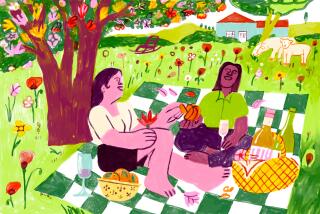Passover : Tasting Notes
- Share via
Tradition means a lot in wine, but the results of technology can be exciting, and the array of California dry kosher wines I tasted last week proved the point convincingly.
In the past, the phrase “kosher wine” meant a wine that lacked freshness. That notion may be completely discarded. The use of flash pasteurization in the last few years has meant wines that are so fresh and sprightly in taste that I actually feel that some need to age a bit before reaching a peak.
Moreover, the kosher wines of the past didn’t use the best fruit. Today’s kosher winemakers are more carefully choosing the vineyards from which they get fruit, and the wines I had were not only substantially better than anything I had tasted in the past, but were indistinguishable from any other wine.
This is true for almost all the California kosher wines I tasted, but the technology and use of top-quality grapes seems not to have reached other parts of the world. The French, Italian and Israeli kosher wines I tasted were not as interesting and not as good a value.
The following wines are highly recommended and will shock those whose only previous experience with kosher white wine has been disappointing. They are listed in order of overall quality.
1993 Baron Herzog Chenin Blanc ($6)--Remarkable taste of leaves and melons, a soft entry and crisp finish, a stunning achievement. This is a wine no one will dislike and it will match with a huge array of foods. One of the more amazing wines I have tasted since it was pasteurized to make it mevushal and thus kosher for all occasions.
1992 Baron Herzog White Zinfandel ($6)--Loads of fruit and berries, a tangy aftertaste, and a taste that was not as sweet as I expected. Lovely wine, and a lot better than a typical aperitif.
1993 Gan Eden Winery Sauvignon Blanc ($8.50)--Spices, green beans and green herbs make this a perfectly delightful example of the Sauvignon character. The wine is lean and crisp and most appealing.
1992 Mount Madrona Chardonnay ($14)--Excellent fruit that implies citrus and pears with just a bare hint of oak. A superb dry finish with just enough richness to expand with richer foods. A marvelous value. Produced as a “second label” by St. Supery Winery of the Napa Valley.
1993 Hagafen Cellars White Table Wine ($9)--A profusion of flowers and apples, and a racy taste that is slightly sweet and still well balanced. Hagafen used to make a Riesling. This appears to be it in disguise, and it’s better than ever.
The following wines are excellent and represent good value for kosher wine buyers.
1992 Herzog Chardonnay ($14)--Complex scents of butter and fig make this wine a little heavier and richer than the Mount Madrona, and may be preferred by those who like a more complex wine. However, the fruit is a bit understated.
1992 Baron Herzog Chardonnay ($12)--Less expensive than the similarly named wine above, it offers a little more fruit, but the oak appears a tad obvious. Still, an attractive wine worth trying.
1992 J. Furst Chardonnay ($9)--This wine nearly hides its kosher statement, but it is made by Herzog and it has a good balance of fruit and oak. A wine that will be better in a year, but a good value now.
1990 Hagafen Cellars Cabernet Sauvignon ($18)--Rich, ripe fruit of black cherry and a hint of plum and cedar. The taste is mainly ripe fruit and a trace of herbs, far more rewarding than most past efforts with kosher red wine. This wine will age nicely, but decanted will be very rewarding now.
1992 Baron Herzog Sauvignon Blanc ($8)--Not very grassy, but a delicate melon and pear aroma and a very dry entry. The wine is nicely balanced and a good match with seafood.
Gan Eden also makes two sweeter wines--an excellent Black Muscat and a very sweet Late Harvest Gewurztraminer--for those who prefer more sweetness in their kosher wines.
More to Read
Eat your way across L.A.
Get our weekly Tasting Notes newsletter for reviews, news and more.
You may occasionally receive promotional content from the Los Angeles Times.









